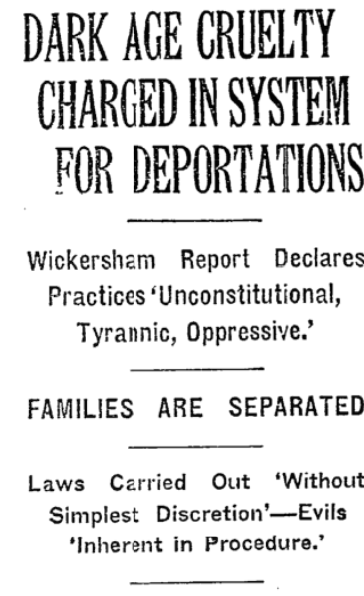It doesn’t take longer than the table of contents to realize how much has stayed the same. “Separation of families.” “Invasion of personal rights.” “Illegal searches and seizures.” “Despotic powers of the administrative agency.” These section headings come from a 1931 US government report on the state of America’s deportation machine.
In 1929, President Herbert Hoover tasked former attorney general George Wickersham with producing a series of reports on law enforcement in the United States. Reuben Oppenheimer, a Baltimore lawyer, was put in charge of immigration. What he found was so appalling that it made the front page of the New York Times.

New York Times
The denials that followed were familiar, too. William Doak, who oversaw deportations as secretary of labor, said the next day that the abuses happened before his tenure. A day later, John Trevor, the head of an anti-immigrant “patriotic” group, warned that he’d heard Oppenheimer was associated with the American Civil Liberties Union. Trevor added that the report’s recommendation to provide immigrants with attorneys would let them avoid deportation with the help of the “shysters who now disgrace the American bar.”
The Wickersham Commission’s largely forgotten report reveals that the immigration debate that’s torn the country apart under President Trump had the same contours a century ago: One side sees inhumanity in the detention and removal of people who came to the United States in search of a better life; the other sees the means necessary to keep out people they don’t want. It’s a reminder that long before Trump, America was violating immigrants’ rights as a matter of course.
If Trump leaves office in a few months, there will be intense pressure from liberals to quickly repeal his immigration policies. The Wickersham report makes the case for doing much more.
Oppenheimer was investigating immigration enforcement as a young Harvard-trained lawyer. Like Wickersham, who worked as a law partner at New York City’s oldest firm before becoming attorney general, he was an establishment reformer, not a radical. Both men believed some deportations were necessary, though the scale was different from today: At the time, the United States had been removing fewer than 10,000 people in an average year, versus the record of more than 400,000 set in 2012.
Still, Oppenheimer concluded that those deportations led to an “almost inconceivable amount of suffering and hardship, of separations of husbands from their wives and of fathers from their children, of exile from a country where the deportee has been a desirable citizen and has formed all his attachments.” He added, “These results occur for the most part not where the deportee has committed a crime but where he has been guilty of a technical violation of the immigrations laws.”